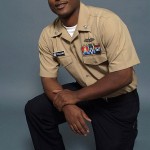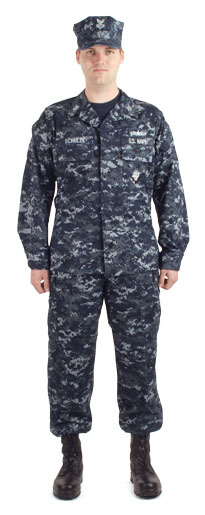A photo stopped me in my tracks the other day at a local restaurant I occasionally frequent.
The owner told me long ago that her son was in the Navy and I got the impression he was a junior enlisted, perhaps a petty officer third class. I noticed a new picture the owner had behind the counter and it featured her son and some others who were wearing what I thought were khaki uniforms. Not looking closely at first, I thought these were all chief petty officers and officers. Those are the ranks that have long worn khakis as service uniforms.
Looking closer I briefly thought “Marine” as the men and women were wearing khaki shirts and dark pants. Then it hit me that the group I saw in the picture were indeed sailors. They were wearing the new Navy service uniform which consists of khaki shirt, black pants and a garrison cap. The latter is the straight-sided cap that is parted in the middle, the kind of which has been worn for ages by Army and Air Force personnel as well as Navy officers and chiefs. Were it not for subtle differences, the uniform would be a dead-ringer for the Marine Corps service dress. That’s not a bad thing, if you want to look like a Marine.
Several years ago the Navy tested new uniforms, perhaps to be more economical, and the present service dress was the winner. To be fair about the finances, it did replace two uniforms, one blue and the other white. At the time of the changes, an FAQ on an official Navy uniform Web site explained:
“While trying to find a functional year-round service uniform for Sailors E-6 and below, our
intent was not to try and make us look like any of the other services. However, the concept we are testing is in line with other services (i.e., a non-vertical match (tops and bottoms are different colors.)

Okay, leave it to my old service to over-explain a concept.
One has to wonder though about the Navy — always different if not unique — looking like other services. They replaced those comfortable and, I’ll say cool as in stylish, dungaree working uniform with their version of the Army Battle Dress Uniform (BDU). The Navy calls it a NWU, for Navy Working Uniform, and it bears camouflage patters with an overall blue and gray color in its main form. There are also woodland and desert camo in case, I suppose, a sailor wants to go hunting for a bear or maybe a camel.
As I have said here before. I like the BDU and especially like it’s main features — mucho pockets — but it is getting done to death as every branch of service has its version of it and cops also wear its variations. I mean, I love cargo pants as it kept men just that much further from having to carry a purse. But the Navy has a rich tradition and I hate to see the uniforms and the service itself set into some kind of national defense force like other countries where navies and armies wear the same uniform.
I have spoke with some sailors who are in today’s Navy and they love the utility of the NWU. I know it has its advantages, and I’m talking other than pockets, such as camo hiding stains from things such as grease or paint. Everything is gray in the Navy if it isn’t blue.

Also, I remember there were many people both inside and outside the Navy who hated the uniforms of my days in the Navy in the mid-1970s. That is when we switched our dress blues from the bell-bottom trouser, jumper and “dixie cup” caps to the dark blue coat, pants and combination for junior enlisted which made us look like chiefs and officers. I never even wore the former uniform although I found the latter was probably much easier to keep than the latter. The dress blues were so hated as a matter of fact, that Navy enlisteds got the old “crackerjack” uniform brought back. The old uniform was new again.
Uniforms come and go. Even though I don’t like the new uniforms very much I don’t really disparage them. It’s who wear the uniform that counts and I know when it comes to that aspect, it really doesn’t matter that much to me what they wear.
